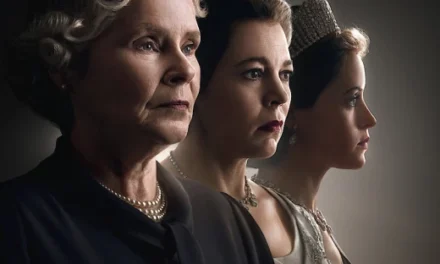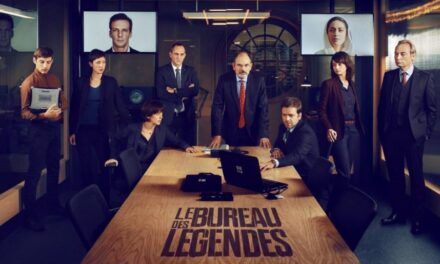Guy Hibbert is no stranger to controversial drama. No Child of Mine – his rendering of an horrific real-life child abuse case brilliantly directed by Peter Kosminsky – was one of the most disturbing and moving British television productions of the 1990s. So I had high hopes for his recent Channel 4 one-off drama Complicit, which follows MI5 agent Edward Ekubo (David Oyelowo) in hot pursuit of a suspected terrorist, Waleed Achmed (Arsher Ali), from Britain to Egypt in order to foil a ricin attack on the United Kingdom. Slow and stylistically unostentatious, Complicit marks a welcome departure from the high octane formula of US ‘war on terror’ dramas such as 24, Threat Matrix and Homeland; but its take on the relationship between terrorism and the British state nevertheless reproduces some of the conservative elements of those shows.

It is curious that some television reviewers have praised the moral complexity of Complicit on the grounds that the drama gives us no ‘goodie’ to root for and no ‘baddie’ to condemn. In fact, Ekubo and Achmed are clearly identifiable as the hero and villain of the piece, respectively. The latter is a shady, sneering figure whom Ekubo observes on surveillance tapes bellowing ‘British troops burn in hell!’ at an anti-war demonstration (this chanting is heard in sinister extradiegetic overdub when Achmed appears later in the film). Achmed is also a malicious racist. Ekubo, on the other hand, is a decent, hardworking and competent agent who nevertheless remains something of an outsider at MI5, under-promoted and alienated from his Establishment colleagues. There are strong implications that racism has played a part in his marginalisation. Frustrated by these workplace problems and his lack of progress in the case – and horrified by Achmed’s apparent disregard for human life – Ekubo allows his suspect to be tortured by the Egyptian police.
%20image%202.jpg)
This turns out to be a big mistake, for the twist in the tale is that Achmed has played Ekubo like a fiddle. There is no ricin attack and Ekubo realises too late that he has been cleverly manipulated by his quarry so that the latter can gain a propaganda advantage. Drawing attention to his torture in the media, Achmed subsequently presents himself to the world as a victim of anti-Islamic prejudice. The disgraced Ekubo, meanwhile, is indefinitely suspended from his post for breaking the rules. For Ekubo, torture – in this case, at least – not only fails to bear fruit, but proves to be counter-productive.
Nevertheless, viewers are hardly encouraged to question either Ekubo’s worldview or the ‘war on terror’ in general. The film’s crucial scene is a tense interrogation-room confrontation in which Ekubo and Achmed exchange their conflicting views of the world. Formally, this is an equally balanced battle of wits between a jihadist and state ‘spook’; yet even when Achmed advances some reasonable arguments, the viewer is left in little doubt where her sympathies ought to lie. When Achmed condemns the British invasion of Iraq and other countries, he is ridiculed by Ekubo, who counters by enumerating the freedoms supposedly enjoyed by British people, including ‘free schools’, ‘state handouts’ and the ‘freedom to say and do what you want’. And any lingering sympathy the viewer may have with Achmed’s arguments about the brutality of British imperialism dissipates when Achmed calls Ekubo a ‘fucking kaffir’ and a ‘nigger’. How can the viewer take seriously any point of view articulated by such a vile bigot – or, for that matter, object to his torture?
The ending of the drama is equally problematic. In his exit interview with his boss at MI5, Ekubo is taken to task for allowing Achmed’s torture; but he protests:
“What else could I have done? Weighing up the illegality against the consequences of doing nothing? I’ve always understood that we work with politically unacceptable regimes if it means we are safeguarding our people from attack at home […] Everything I’ve done has been for my country, for the people of my country”
The patriotic message here is clear enough: the security of ‘our people’ can only be achieved through the suspension of human rights and the illegal but necessary use of force by agents of ‘our’ state (an ‘acceptable’ regime, no doubt). This is in essence the perspective of Kathryn Bigelow’s recent film Zero Dark Thirty, whose ‘normalisation’ of torture has been challenged by Slavoj Žižek in terms that are highly relevant here: ‘Torture saves lives? Maybe, but for sure it loses souls – and its most obscene justification is to claim that a true hero is ready to forsake his or her soul to save the lives of his or her countrymen’.
Ekubo is certainly a troubled figure at the conclusion of the film, as he stands on the banks of the Thames watching the world go by and presumably reflecting on the wisdom of his actions (a reprise, strangely enough, of Oyelowo’s pose in the final scene of the 2006 BBC drama Shoot the Messenger). Indeed, we end on a rather questioning note: in the final shot, Ekubo looks directly into the camera, as if to ask viewers what they would have done in his position. But this ‘open’ gesture is hardly sufficient to override Ekubo’s explicit, patriotic justification for torture. Moreover, the preceding shots of Londoners happily going about their daily business seem to confirm that Edward has indeed done the right thing and that only similarly decisive actions in the future can safeguard the ‘British way of life’.
Defenders of Complicit may point to the the production’s unglamorous style, as well as its troubled hero and the supposed moral complexity of the situation he finds himself in. Indeed, the film is pervaded by a sense of indeterminacy: Ekubo often seems to be distracted, homing in on seemingly irrelevant details (for example, during a visit to his superior’s office, a point of view shot reveals that he is focusing on a box of antacids) and he is often shot in shallow focus, creating blurred backgrounds that seem to reflect his uncertain state of mind. Yet despite these markers of uncertainty, complexity, ‘seriousness ‘ and, indeed, ‘quality’, the production tends to foreclose criticism of the state’s anti-terrorism methods or the relationship between jihadist terrorism and imperialist aggression. Complicit, like so much ‘terrorism TV’ (I borrow the phrase from Stacy Takacs’s superb book on the subject), contributes to the naturalisation of the ‘state of exception’ along with its disciplinary apparatuses of surveillance, detention and torture.
For anybody with a critical perspective on these topics, however, the one-off in-house BBC drama Our Girl, written by veteran Tony Grounds and starring EastEnders actress Lacey Turner, is even more troubling.

Molly Dawes (Turner) is a working class girl from East London who joins the British army in order to escape from her obnoxious Albanian boyfriend Artan (Dan Black) and her selfish and racist father (Sean Gallagher), who spends his days smoking, drinking and playing violent video games. Commencing her training programme, Molly soon adapts to the rigours of military discipline and the army becomes her surrogate family.
Our Girl reproduces many of the generic scripts of military-themed ‘human interest’ documentaries, such as BBC3’s Girls on the Frontline (2010): an emphasis on personal sacrifice, an unquestioning acceptance of the necessity for military intervention overseas, and a focus on its subject’s transition from a restricting working class milieu to the excitement and challenge of army life. As several television critics have noted, the rather idealised depiction of Molly’s military training resembles an army recruitment video. Indeed, the drama offers a highly affirmative view of the army and its mandate, counterposing Molly’s desire to ‘do something’ with her slobbish father’s goal of securing long-term incapacity benefit (at a moment when benefit claimants are under attack in so much of the media, this portrait of a ‘benefit scrounger’, like Ekubo’s reference to ‘state handouts’ in Complicit, is problematic). At the end of the drama, Molly ‘passes out’ as a soldier and goes to Afghanistan, while her father lounges at home watching news reports about Al Qaeda bombings. The implication of this parallel editing is clear: Molly is about to play her part in tackling terrorism, while her feckless father rots on the sofa.

Yet the drama’s most direct pro-war statement comes earlier in the film, when Molly returns to London on leave with her meek training colleague Katy (Katherine Pearce). Here Molly must cope with the incomprehension of her friends, who cannot understand why she has ‘joined up’, and her father’s insistence that she stay in England and get married. It is at this point that Katy finds her voice for the first time, drawing a parallel between Molly’s father and boyfriend and the patriarchal control of women in Afghanistan: ‘You know, that’s exactly what we’re fighting for in Afghanistan’, she tells Molly’s father, ‘So that women can have a say in who they marry or if they get married at all’. Since Molly’s father can only respond with a racist rant, Katy’s ‘feminist’ argument prevails.
But here the drama is on very thin ice. Certainly, the argument that the invasion of Afghanistan was undertaken for the benefit of Afghan women was widely touted in the news media in the run-up to the war, and, as Wikileaks has revealed, was promoted by the CIA in order to boost flagging public support for the occupation. Yet it is difficult to believe that this was ever anything more than a flimsy pretext for imperialist intervention. In a devastating critique of the ‘progressive’ argument for the invasion of Afghanistan, Carole Stabile and Deepa Kumar note that the liberation of women was neither the aim of the war nor its result. Pointing to the Orientalist dimensions of the supposed drive to ‘save’ Muslim women, they argue that ‘the rhetoric of women’s liberation’ was ‘a cynical ploy’ and even ‘a lie as monumental as the claims about WMD’. It is therefore unfortunate that the producers of Our Girl are content to give such rhetoric a free pass.
All too often in British television dramas about the ‘war on terror’, criticisms of Western imperialism are either absent or articulated by such unpleasant characters that they cannot be taken seriously, while the invasions of Afghanistan and Iraq are justified by appeals to the feminist discourse of ‘liberation’. In the three-part Occupation (2009), for example – the BBC’s only drama about the Iraq war – the most trenchant criticism of the coalition invasion is placed in the mouth of a corrupt Iraqi policeman-turned-terrorist, while the drama as a whole casts the British forces in Iraq as liberators rather than invaders, victims rather than perpetrators of violence.
Yet British television audiences have been offered more critical perspectives on the war on terror over the last decade. Peter Kosminsky’s The Government Inspector (Channel 4, 2005), for instance, questioned the role of the Labour government in taking Britain to war in Iraq, while his later Britz (Channel 4, 2007) was equally critical of the effects of domestic ‘anti-terror’ laws on British Muslims following 9/11. Tony Marchant’s The Mark of Cain (Channel 4, 2006), meanwhile, remains the only television drama to have seriously engaged with the issue of prisoner abuse by the British army. These dramas interrogate the conduct of ‘our’ state in the war on terror; dramas such as Complicit and Our Girl, on the other hand, emphasize the threat posed by the terrorist ‘other’.
In his book Democracy Incorporated, Sheldon Wolin warns that ‘in the reality of the war between imperialism and terrorism, the contemporary citizen, far from being invited into a discussion, is, as never before, being manipulated by “managed care” and by the managers of fear’. We need television fictions that challenge rather than reinforce this state of affairs, that ‘invite discussion’ about terrorism and imperialism and their interrelationship. Controversial as they may be, the dramas of Kosminsky and Marchant certainly do this. They show the way forward for writers and producers who are prepared to criticise the ‘home team’, to cut through the bias and distortion that has so often characterised the treatment of the war on terror in both journalism and screen fiction.
Stephen Harper is Senior Lecturer in Media Studies at the University of Portsmouth. He has published many articles on British television drama and documentary, television and film images of war and cultural representations of mental distress and is the author of the books Madness, Power and the Media (2009) and Beyond the Left: The Communist Critique of the Media (2012).





